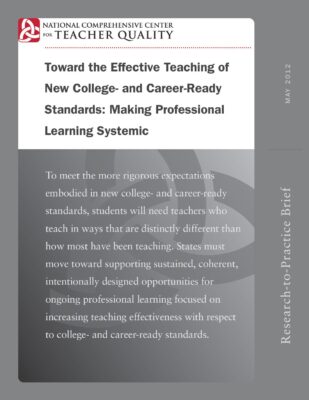Resource Hub
Explore guides, research papers, policy briefs, and tools to aid decisions on standards and assessments.
Toward the Effective Teaching of New College- and Career-Ready Standards: Making Professional Learning Systemic
This Research-to-Practice Brief states its purpose as describing the elements necessary to align state-level policies and practices with one another, and to move away from professional development and toward professional learning. This would allow teachers in more schools to have access to the conditions, incentives, and opportunities for engaging in professional learning that is less fragmented and more coherent, more relevant, and better differentiated. The brief discusses how state-level professional development policy, teacher certification policy, teacher evaluation policy, and teacher compensation policy can come together to build systems to support true professional learning. Throughout the brief, examples are provided of states that are taking important steps toward ensuring that all teachers are ready and able to prepare their students for college and careers in the 21st century.


This brief describes opportunities for change, from adopting and deploying professional learning standards to aligning human capital systems to help ensure that all students meet the new college- and career-ready standards. The brief notes that “changes will require improved collaboration among different parts of education agencies so that those in charge of educator certification, professional development, educator evaluation, college- and career-ready standards implementation, and data management work together to build a more coherent system of professional learning.” The charts, figures, and examples of positive state practices are presented in a format that is easy to access and understand. Supporting research on the value of a “professional learning” approach is provided along with definitions noting its difference from “professional development.”